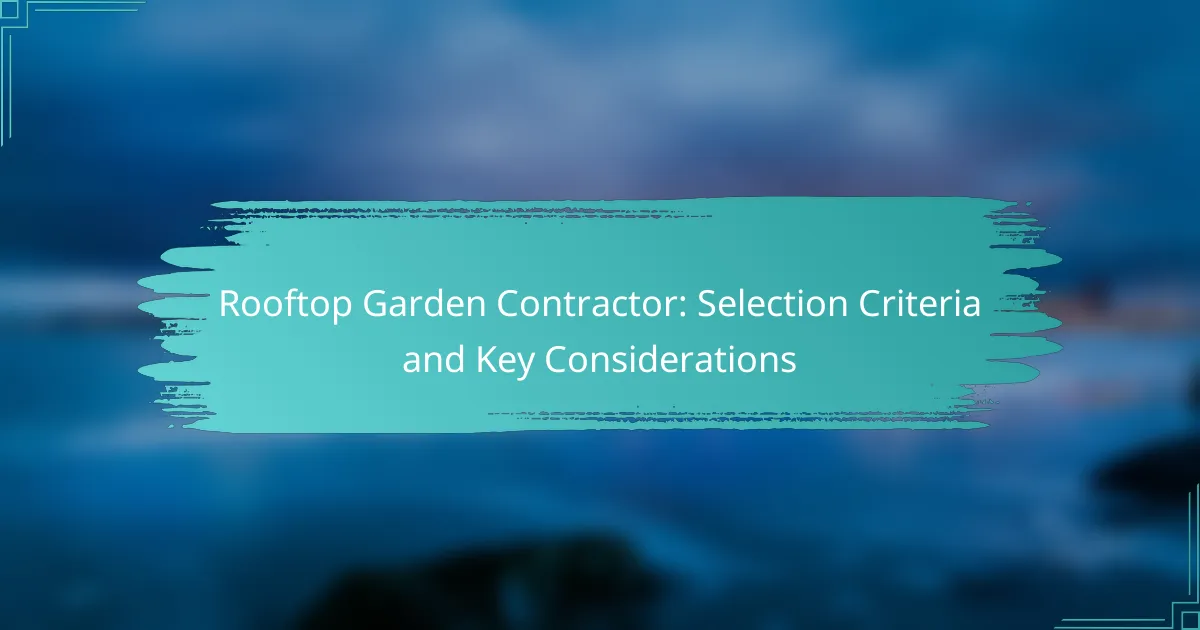Selecting the right contractor for your rooftop garden is crucial for achieving a successful and sustainable project. It’s essential to evaluate their expertise, past work, and reputation, particularly in navigating the unique challenges of urban environments. Key considerations such as budget, timeline, and sustainability practices will help ensure that your vision is realized effectively and efficiently.
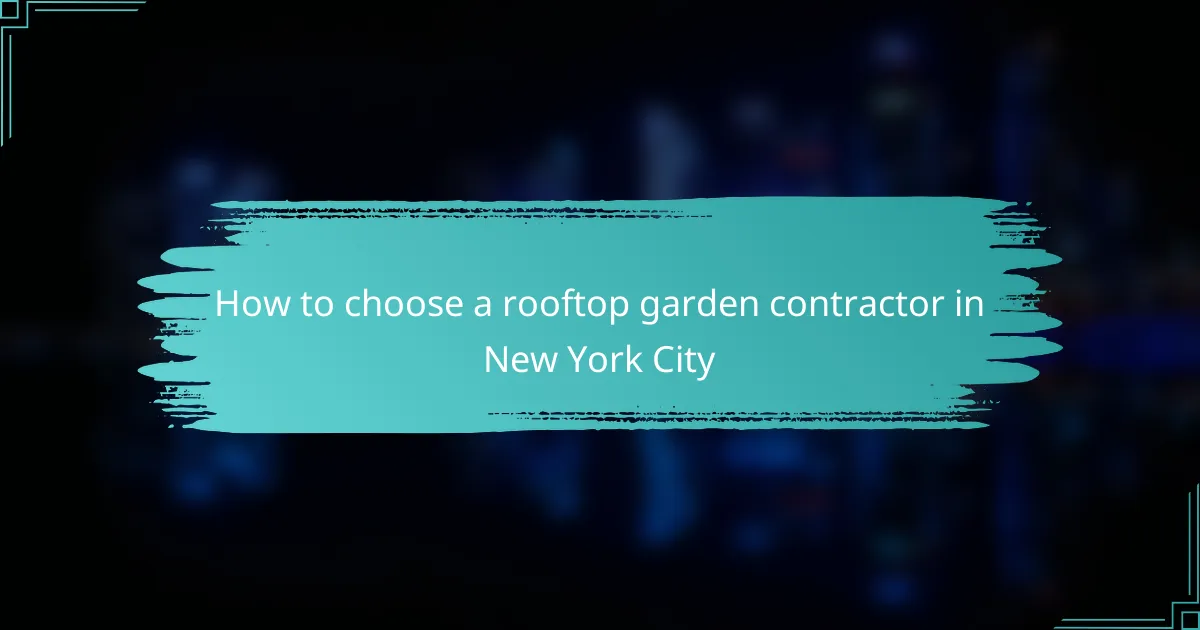
How to choose a rooftop garden contractor in New York City
Selecting a rooftop garden contractor in New York City requires careful consideration of their expertise, past work, and overall reputation. Focus on contractors who understand the unique challenges of urban environments and can deliver sustainable, aesthetically pleasing designs.
Experience with urban rooftop gardens
When choosing a contractor, prioritize those with specific experience in urban rooftop gardens. These projects often involve unique structural considerations, local regulations, and environmental factors that differ from traditional landscaping.
Look for contractors who have worked on similar projects in NYC, as they will be familiar with the city’s zoning laws and building codes. A contractor with a strong background in urban settings is more likely to navigate these challenges effectively.
Portfolio of completed projects
A comprehensive portfolio showcases a contractor’s design style and capabilities. Review their past rooftop garden projects to assess the quality of their work and whether it aligns with your vision.
Pay attention to the diversity of their projects, including the types of plants used, layout designs, and innovative features. A varied portfolio indicates versatility and creativity, essential for a successful rooftop garden.
Client testimonials and reviews
Client feedback provides valuable insights into a contractor’s reliability and quality of service. Seek out testimonials and reviews from previous clients to gauge their satisfaction and overall experience.
Consider checking online platforms and local forums for unbiased reviews. Positive testimonials can indicate a contractor’s ability to meet deadlines, communicate effectively, and deliver on promises.
Licensing and insurance verification
Ensure that any contractor you consider is properly licensed and insured. In New York City, contractors must comply with local regulations, and having the appropriate licenses demonstrates their professionalism and adherence to standards.
Verify their insurance coverage to protect yourself from potential liabilities during the project. A reputable contractor should readily provide proof of both licensing and insurance upon request.
Design and maintenance services offered
Evaluate the range of design and maintenance services a contractor provides. Some may offer comprehensive packages that include initial design, installation, and ongoing maintenance, which can simplify the process for you.
Consider your long-term needs; if you prefer a low-maintenance garden, look for contractors who specialize in drought-resistant plants and sustainable practices. Discuss your preferences upfront to ensure they can deliver a suitable solution.
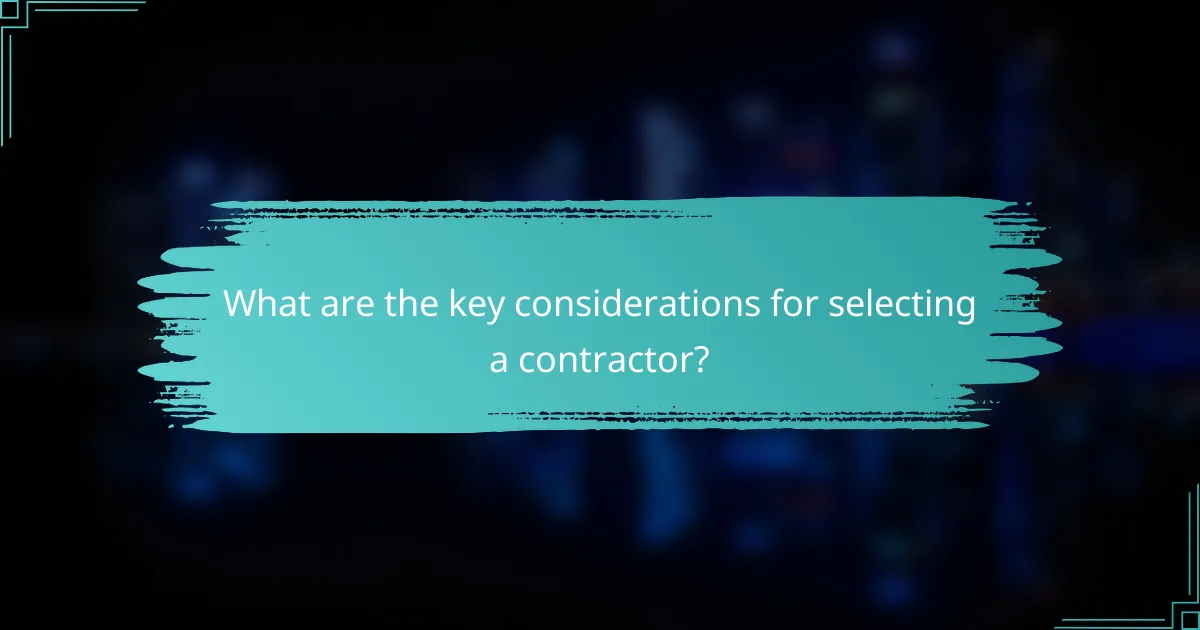
What are the key considerations for selecting a contractor?
Selecting a contractor for your rooftop garden involves evaluating several critical factors to ensure a successful project. Key considerations include budget, timeline, and the contractor’s approach to material sourcing and sustainability practices.
Budget and pricing structures
Understanding the budget and pricing structures is essential when selecting a contractor for your rooftop garden. Contractors may offer fixed-price contracts, time-and-materials agreements, or a combination of both, so clarify these details upfront.
Request detailed quotes that break down costs for labor, materials, and any additional services. This transparency helps you compare different contractors effectively and avoid unexpected expenses.
Timeline for project completion
The timeline for project completion is another crucial factor to consider. Discuss the estimated duration of the project with potential contractors and ensure they can accommodate your schedule.
Ask about their availability and any potential delays that could arise from weather conditions or material sourcing. A clear timeline helps set expectations and allows for better planning on your part.
Material sourcing and sustainability practices
Material sourcing and sustainability practices are increasingly important in rooftop garden projects. Inquire about the types of materials the contractor uses and their commitment to environmentally friendly options.
Look for contractors who prioritize local sourcing, as this can reduce transportation emissions and support the local economy. Additionally, ask about their waste management practices to ensure they align with your sustainability goals.
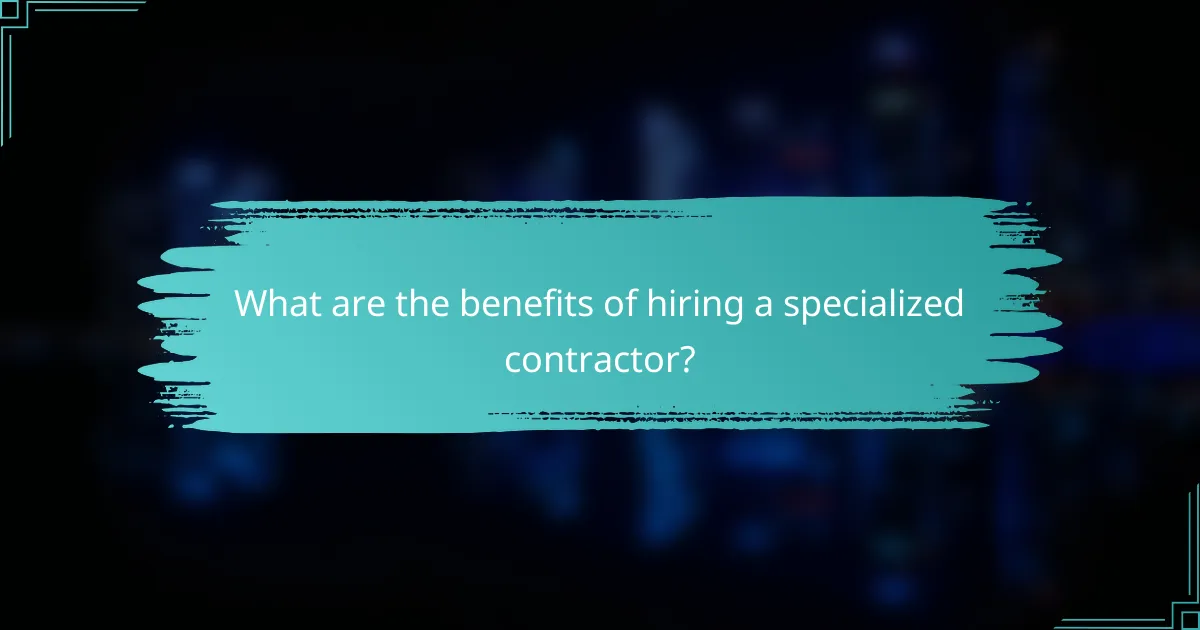
What are the benefits of hiring a specialized contractor?
Hiring a specialized contractor for your rooftop garden provides significant advantages, including expertise in design, compliance with local regulations, and access to high-quality materials. These benefits ensure that your project is executed efficiently and meets your aesthetic and functional needs.
Expertise in local regulations
A specialized contractor understands the local zoning laws, building codes, and environmental regulations that govern rooftop gardens. This knowledge is crucial for ensuring compliance and avoiding potential fines or project delays.
For instance, in many urban areas, there may be restrictions on weight loads, drainage systems, or plant selections. A qualified contractor can navigate these regulations effectively, ensuring your garden is both beautiful and legal.
Access to quality materials
Specialized contractors have established relationships with suppliers, allowing them to source high-quality materials that may not be readily available to the general public. This access can lead to better pricing and superior products for your rooftop garden.
For example, they can provide durable planters, premium soil, and native plants that thrive in your local climate, enhancing the longevity and sustainability of your garden.
Innovative design solutions
With experience in rooftop gardens, specialized contractors can offer innovative design solutions tailored to your specific space and needs. They can integrate features like irrigation systems, lighting, and seating areas that maximize the functionality and enjoyment of your garden.
Additionally, they can suggest creative plant arrangements and layouts that not only look appealing but also enhance biodiversity and microclimates, making your rooftop a vibrant ecosystem.
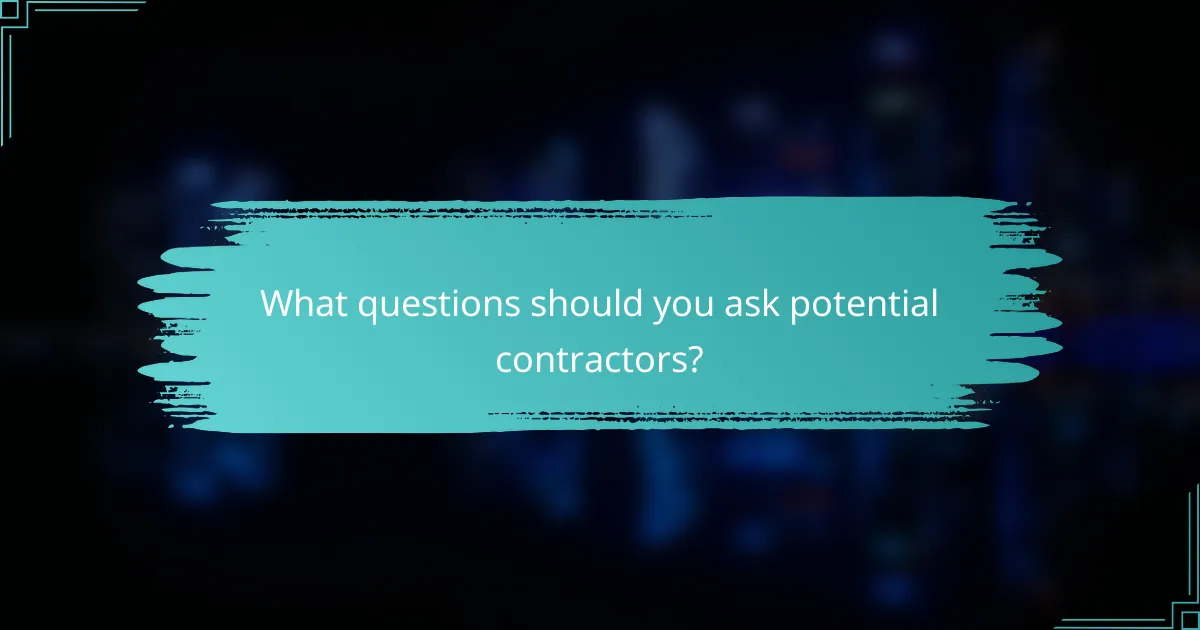
What questions should you ask potential contractors?
When selecting a rooftop garden contractor, it’s crucial to ask specific questions that reveal their expertise and reliability. This ensures that you choose a contractor who can meet your design and maintenance needs effectively.
What is your design process?
A clear design process is essential for a successful rooftop garden. Ask the contractor to outline their approach, including initial consultations, design drafts, and how they incorporate your ideas. Understanding their workflow helps you gauge their creativity and flexibility.
Consider whether they use software tools for design visualization, as this can enhance communication and ensure you have a clear picture of the final outcome. A good contractor will also discuss plant selection, irrigation systems, and structural considerations during the design phase.
How do you handle project delays?
Delays can occur for various reasons, such as weather conditions or supply chain issues. It’s important to ask potential contractors how they manage these situations. A reliable contractor should have a contingency plan in place and be transparent about potential delays.
Inquire about their communication practices during delays. Regular updates can help you stay informed and reduce frustration. Additionally, understanding how they prioritize tasks can give you insight into their project management skills.
What warranties do you provide?
Warranties are a critical aspect of any construction project, including rooftop gardens. Ask contractors about the warranties they offer for both materials and workmanship. A solid warranty can protect your investment and provide peace of mind.
Look for warranties that cover a reasonable duration, typically ranging from one to several years. Ensure you understand the terms and conditions, including what is covered and any maintenance requirements that may affect the warranty’s validity.
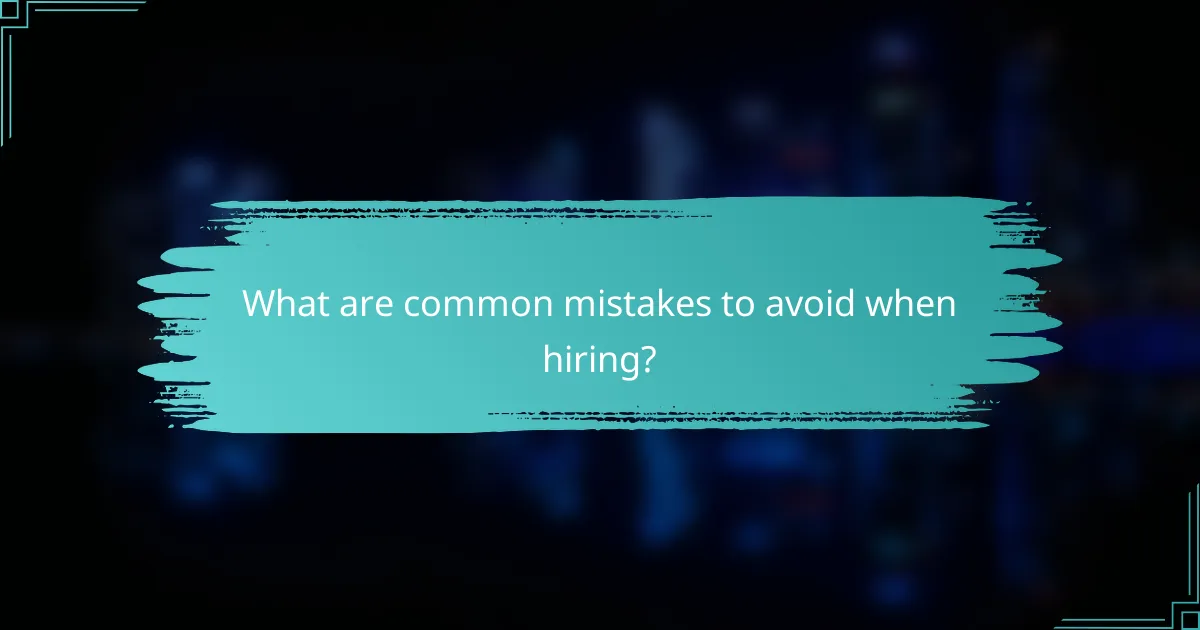
What are common mistakes to avoid when hiring?
When hiring a rooftop garden contractor, avoiding common mistakes can save time and money. Key pitfalls include not checking references and ignoring contract details, both of which can lead to unsatisfactory results or disputes.
Not checking references
Failing to check references is a significant mistake when selecting a rooftop garden contractor. Verifying past work through client testimonials or case studies can provide insight into the contractor’s reliability and quality of work.
Ask for at least three references and follow up with them. Inquire about their experience, the contractor’s adherence to timelines, and how well they communicated throughout the project. This can help you gauge whether the contractor is a good fit for your needs.
Ignoring contract details
Ignoring contract details can lead to misunderstandings and unexpected costs. A well-drafted contract should outline the scope of work, payment terms, timelines, and any warranties or guarantees.
Before signing, review the contract carefully and clarify any ambiguous terms. Ensure that all verbal agreements are documented. This diligence can prevent disputes and ensure that both parties have aligned expectations throughout the project.
